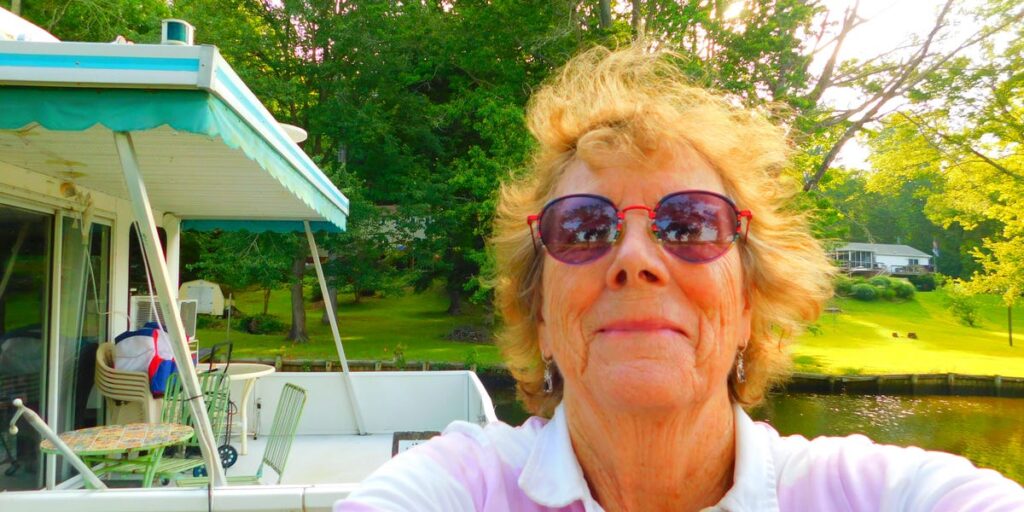This as-told-to essay is based on a conversation with Cheryl Fellenz, 81, a retiree who lives on a houseboat off the coast of southern Maryland. She is one of thousands of older Americans who have shared their financial, career, and retirement stories with Business Insider. This interview has been edited for length and clarity.
The idea of living on a houseboat felt like serendipity. I retired at 51 from my teaching career as a reading specialist. I had never been a boater or a boat captain or anything, but one day in 2009, a couple of friends were in my living room talking about this funky Washington DC boat yard down M Street. My spirit was attracted to that. When I drove down by the water and saw those boats at the marinas, I was like “oh, yeah, I’m doing this.”
Soon after, I sold my house, paid off the mortgage, bought my houseboat in cash, and then started my adventure. It was right after the market crash, so I sold my house — which I had been living in for 15 years — at a loss, but I was able to buy the houseboat for roughly $84,000. I knew the decision to move would cut my living expenses and I no longer have a mortgage.
Photo Courtesy of Cheryl Fellenz
Lucky for me, if you have a pension, you don’t even have to think about a 401(k). I don’t have any savings, but my Social Security and teacher’s pension add up to $4,996 a month, which is comfortable for me to live on. I keep an accounting book and I write down all my expenses — the fee to dock my houseboat is $275 a month, then I need to afford groceries and utilities. Praise God, I’m in excellent health. If something happens, I put it on my credit card, then I pay it off. I am disciplined with that.
I’m paying toward my next financial goal: to be totally debt free. Boats can have more expenses than houses sometimes. After I got settled here, I had to pay several thousand dollars to fix the roof, air conditioner, and electricity. I paid for those repairs with my credit cards, and I’m hoping to have it down to zero by the end of this year. Once that’s done, I’ll have an extra $2,000 a month of spending money.
Photo Courtesy of Cheryl Fellenz
I live an alternative lifestyle. I don’t have children and I’m not married. But I have my routine: I go to the gym, I fill up a few gallons of fresh water at a natural spring off Route 488, I cook on my hot plate or grill, and I run my errands. I also teach a few local children how to read. I don’t charge the families anything, but it gives me a sense of purpose. Even though I’m at this later stage of my life, I still can say, “oh, I have something to do today.”
I don’t feel lonely. In my early years, I was the ultimate party girl. I loved to go to bars, listen to music, and go dancing. Now that I’m a little older, I wind it down a bit. I talk to friends, I go to social events held by my boating association, and I go once a week to a nearby jazz club. I would tell anyone planning to retire: be open to new experiences. Cultivate your imagination. Ask yourself: “Gee, where would I want to live? What’s important to me?”
The houseboat has absolutely been an adventure for me. When I moved in all those years ago, the DC-area had a giant snowstorm. It was like a foot above my knees. I had to shovel the dock, about the length of a football field, but I felt so proud of myself. I felt so alive. I literally think living here keeps me young.
I’m happy with how my life is and the people in it. From my childhood, I’ve always loved nature. I see eagles, ospreys, gray and blue herons, and little turtles on the boat everyday. This is my dream come true.
Photo Courtesy of Cheryl Fellenz
Do you have a story to share? If so, reach out to this reporter at allisonkelly@businessinsider.com or via Signal at alliekelly.10

